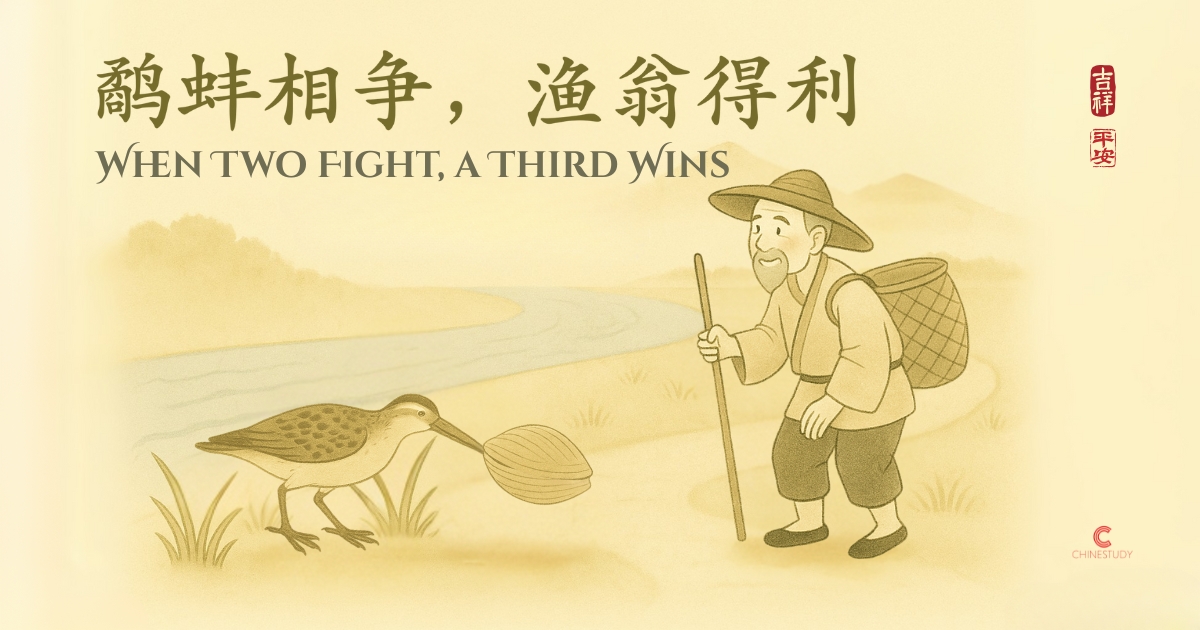🎣 鹬蚌相争,渔翁得利 yù bàng xiāng zhēng, yú wēng dé lì – When Two Fight, a Third Wins

🔍 What It Means
鹬蚌相争,渔翁得利 (yù bàng xiāng zhēng, yú wēng dé lì) literally means:
“The snipe and the clam fight, the fisherman benefits.”
Word-for-word:
- 鹬 (yù) – snipe (a kind of bird)
- 蚌 (bàng) – clam
- 相争 (xiāng zhēng) – to fight with each other
- 渔翁 (yú wēng) – fisherman
- 得利 (dé lì) – gains benefit
It means: When two parties fight, a third party gains.
In English, you might say:
- ⚔️ “While two dogs fight for a bone, a third runs away with it.”
- 📦 “Caught up in the fight — someone else profits.”
🏺 Where It Comes From
This idiom comes from a story recorded in Zhan Guo Ce (Strategies of the Warring States).
One day, a snipe flew down and tried to eat a clam.
The clam quickly closed its shell, trapping the bird’s beak.
Neither would let go.
The snipe said,
“If it doesn’t rain today or tomorrow, you’ll die from drying out.”
The clam replied,
“If you don’t pull your beak out soon, you’ll starve.”
While they argued, a fisherman walked by…
and caught them both. 🎣
💬 How to Use It
Use 鹬蚌相争,渔翁得利 (yù bàng xiāng zhēng, yú wēng dé lì) to describe a situation where two people or groups are so busy fighting, they don’t notice someone else quietly winning.
- ⚠️ It’s often a warning — don’t get caught up in pointless conflict.
- 🗣 Also used to describe clever people who win by letting others weaken each other.
💡 Bonus Tip: You Don’t Always Have to Say the Whole Idiom
In daily conversation, Chinese speakers often shorten this idiom.
You can say just:
- 鹬蚌相争 (yù bàng xiāng zhēng) – to focus on the conflict between two sides.
- 渔翁得利 (yú wēng dé lì) – to highlight the benefit gained by the third party.
🎯 Real Examples
1. 他们两个一直吵个不停,结果班长的位置被另一个人拿走了,真是鹬蚌相争,渔翁得利。
- Tāmen liǎng ge yìzhí chǎo gè bù tíng, jiéguǒ bānzhǎng de wèizhì bèi lìng yí ge rén ná zǒu le, zhēn shì yùbàngxiāngzhēng, yúwēngdélì.
- 👉🏼 The two of them kept fighting nonstop, and in the end, someone else got the class leader position — classic case of “two fight, third wins.”
2. 两家公司为争一个项目互相打价格战,最后却让第三家公司渔翁得利。
- Liǎng jiā gōngsī wèi zhēng yí ge xiàngmù hùxiāng dǎ jiàgé zhàn, zuìhòu què ràng dì-sān jiā gōngsī yúwēngdélì.
- 👉🏼 Two companies fought over a project with price wars, but in the end, a third company got the deal.
3. 两个部门为了一个预算争得不可开交,真是一场鹬蚌相争。
- Liǎng ge bùmén wèi le yí ge yùsuàn zhēng de bùkěkāijiāo, zhēn shì yì chǎng yùbàngxiāngzhēng.
- 👉🏼 The two departments fought fiercely over a budget — a classic case of mutual struggle with no clear winner.
⚠️ Common Mistakes (Watch Out!)
- ❌ Mistake: Using this idiom for any kind of three-person situation.
- ✅ Correct: It specifically means two people are in conflict, and a third party gains unexpectedly.
💡 Memory Tip

Picture a bird and a clam stuck in a stubborn fight…
Neither side gives up.
But a fisherman walks by — and wins without trying.
That’s 鹬蚌相争,渔翁得利 (yù bàng xiāng zhēng, yú wēng dé lì):
💡 Don’t get so caught in the fight that you forget who’s really watching.
✍🏻 Interactive Practice
Translate this sentence into English:
- 他们两个打得不可开交,却让别人轻松得了好处,简直是鹬蚌相争,渔翁得利!
Answer:
The two of them fought like crazy, but someone else easily got the benefit — it’s exactly like “when two fight, a third wins.”
🌟 Final Thoughts
Fighting over something might feel urgent…
But 鹬蚌相争,渔翁得利 reminds us:
- 🧠 Stay aware.
- ⚖️ Don’t waste energy on battles that help someone else.
Sometimes, the smartest move —
is to step back and see the bigger picture.
👉 Stay tuned for the next idiom in this series!
Thank you for subscribing!
Have a great day!